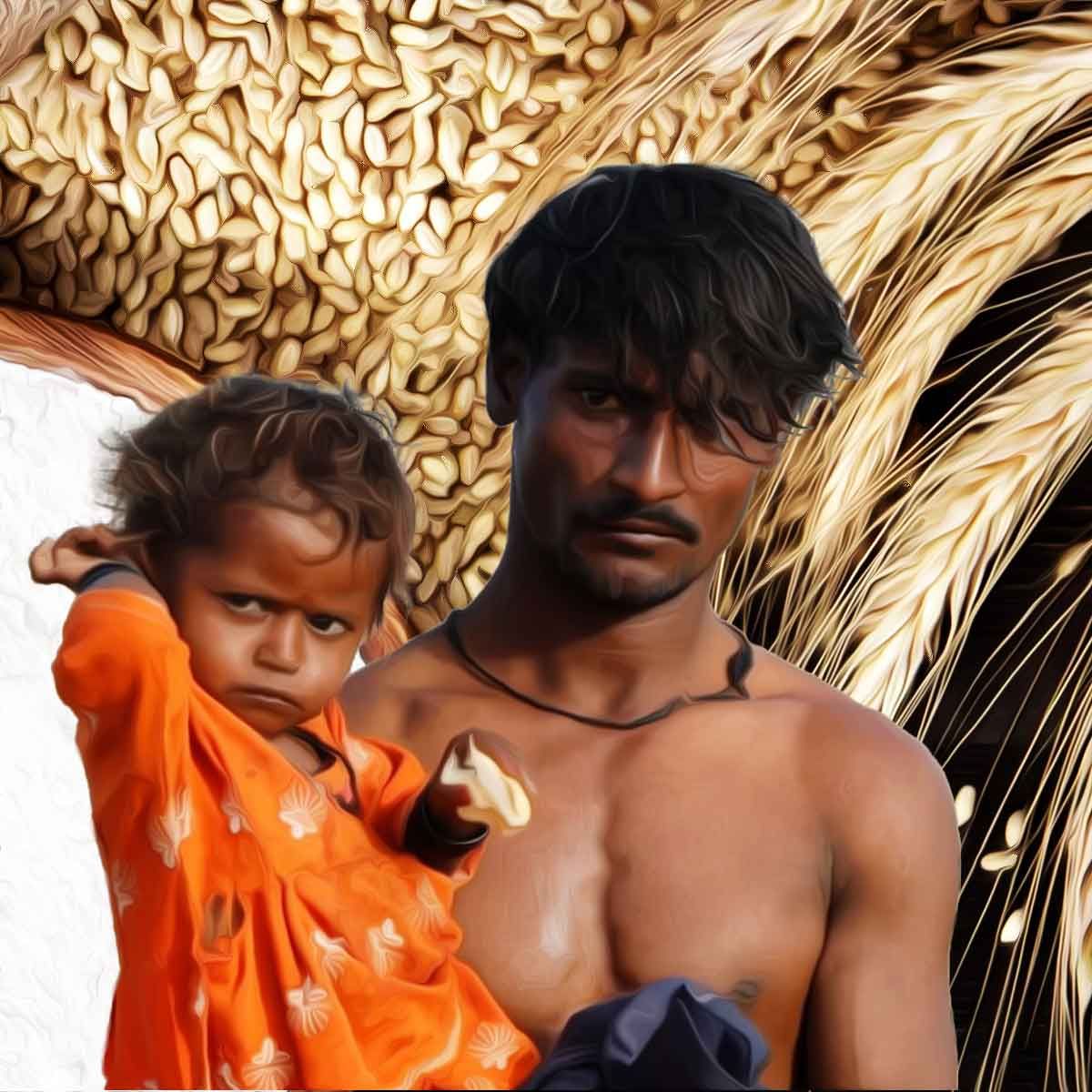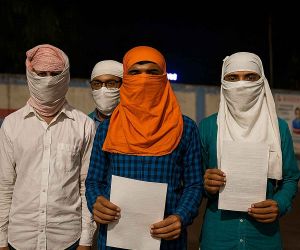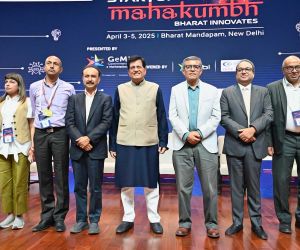MORE COVERAGE
Twitter Coverage
Satyaagrah
Written on
Satyaagrah
Written on
Satyaagrah
Written on
Satyaagrah
Written on
Satyaagrah
Written on
JOIN SATYAAGRAH SOCIAL MEDIA
"Silent Peekaboo": Beneath a veil of diplomacy lies a potent quest for dominance—clear signs emerge of a US-led strategy to unseat Sheikh Hasina's government, signaling a covert regime change operation that beckons India to stand wary and watchful
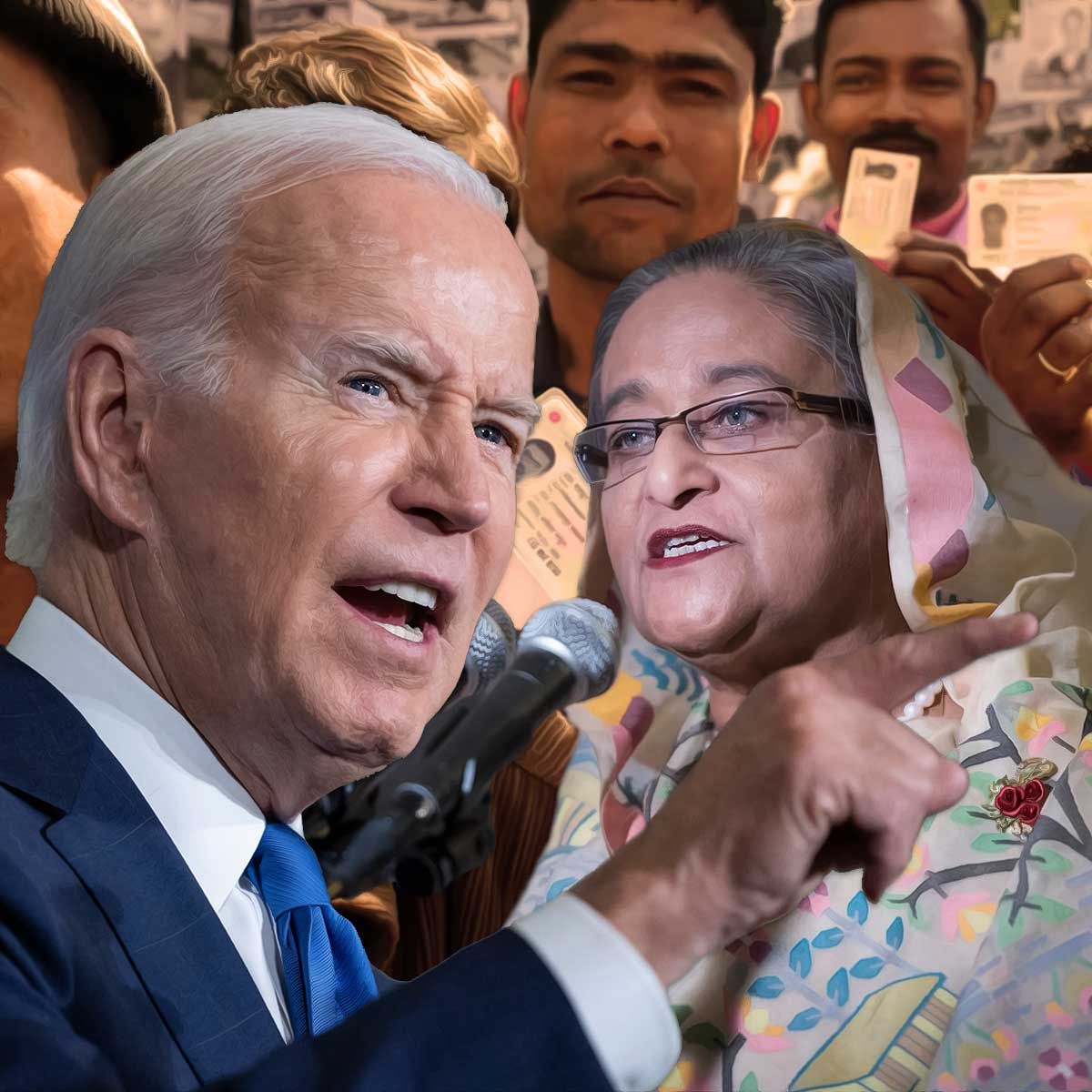
In January 2024, Bangladesh is poised for a pivotal election, one that could see the Awami League, under the leadership of Prime Minister Sheikh Hasina, secure a third consecutive term. Since 2009, Sheikh Hasina has helmed the nation's government, shaping its political landscape.
|
As the electoral battle approaches, merely two months away, significant concerns are emerging. Accusations are being leveled against the United States government, its agencies, and associated media outlets. They stand accused of engaging in a 'regime change operation' in Bangladesh. This operation is said to be designed to unseat the current government, a move that could have profound implications for regional politics.
These developments warrant close scrutiny, especially from neighboring India. The undercurrents of such international maneuvers hold potential repercussions for geopolitical dynamics in South Asia. India, sharing a substantial border and intertwined history with Bangladesh, must remain vigilant. The implications of a shift in Bangladesh's governance could echo throughout the region, bearing consequences for diplomacy, security, and bilateral relations.
Recent maneuvers suggest an attempt to recast the image of Bangladesh's sitting Prime Minister Sheikh Hasina, framing her not as a democratic leader but as an autocratic figure. This narrative is reportedly being advanced by the US administration under President Joe Biden, cloaked in the rhetoric of safeguarding democracy and ensuring the conduct of 'free and fair elections' in Bangladesh.
|
The narrative took a conspicuous turn on Thursday, 2nd November, when Time magazine featured Sheikh Hasina on its cover, leveling serious accusations against her leadership. The article, titled 'Sheikh Hasina and the Future of Democracy in Bangladesh,' sparked controversy by questioning the democratic integrity under her regime. The piece's tone and timing have drawn parallels to a previous article by Time magazine that targeted Indian Prime Minister Narendra Modi prior to India's 2019 general elections, hinting at a pattern of interventionist media coverage at critical political junctures.
This portrayal in a major international publication has raised alarms about the nature of influence and involvement by external entities in Bangladesh's electoral process. It also prompts a reflection on the role of media in shaping political destinies, especially in the context of pivotal elections that could determine the trajectory of a nation's democratic journey. The situation poses a significant point of concern for stakeholders within and beyond Bangladesh's borders, as the integrity of electoral processes is a cornerstone of democratic sovereignty.
In the lead-up to the Bangladeshi elections, the involvement of the United States has become increasingly conspicuous. The US government's media channels have spotlighted Prime Minister Sheikh Hasina, coinciding with pointed diplomatic gestures. Just days ago, US Ambassador to Bangladesh, Peter Haas, made a public call for the ruling Awami League to initiate dialogue with the opposition Bangladesh Nationalist Party (BNP).
|
Ambassador Haas not only encouraged political discourse but also actively engaged with Kazi Habibul Awal, Bangladesh’s Chief Election Commissioner. During their meeting, Haas stated, “Any action that undermines the democratic elections process — including violence, preventing people from exercising their right to peaceful assembly and internet access – call into question the ability to conduct free and fair elections.” This statement seems to extend beyond diplomatic courtesy into the territory of direct political advisement, an action that some might interpret as an overstep into Bangladesh's sovereign electoral affairs.
Further intensifying the scrutiny, the Bureau of South and Central Asian Affairs of the US State Department commented on recent disturbances in Dhaka. On 28th October, they issued a statement via Twitter: “The United States condemns today’s political violence in Dhaka. We call for calm and restraint on all sides and will review all violent incidents for possible visa restrictions.” This stance suggests a readiness to apply diplomatic pressure in the form of visa restrictions, a move that signals a strong stance from the US on the internal political climate of Bangladesh.
Such developments prompt us to consider the delicate balance between international diplomacy and internal politics. The timing and tenor of these interventions raise questions about the influence of external powers on national electoral processes. The global community, particularly India, as a regional ally and neighbor, should reflect on the implications of these events. It underscores the need for vigilance in safeguarding the sanctity of electoral sovereignty and the principles of non-interference, ensuring that the democratic will of the people remains the paramount force shaping the future of nations.
The political temperature in Bangladesh is reaching a fever pitch as opposition party members, specifically from the Bangladesh Nationalist Party (BNP), engaged in violent confrontations with law enforcement. This turmoil, aimed at challenging the ruling Awami League government, unfolded hours before a significant policy announcement from the United States.
|
In May, a decisive move by US Secretary of State Antony Blinken introduced a visa policy aimed squarely at those implicated in disrupting democratic elections in Bangladesh. Blinken took to social media to announce, “Today, I announced a new visa policy to promote free and fair elections. Under this policy, we can impose visa restrictions on individuals and their immediate family members if they are responsible for, or complicit in, undermining the democratic election process in Bangladesh.” This policy, which directly targets individuals believed to be hindering the democratic process, places personal accountability at the forefront of international electoral integrity efforts.
This statement serves as a stark reminder of the global community's watchful eye over Bangladesh's electoral proceedings. The US's approach, coupling diplomatic dialogue with the imposition of personal sanctions, suggests a multi-faceted strategy to influence the election's outcome or, at the very least, ensure its fairness and transparency. The repercussions of such a policy are not to be underestimated, as they potentially alter the political calculus for key players within Bangladesh's electoral landscape.
While the intention to uphold democratic principles is clear, the implications of such external policies on national sovereignty and the right to self-determination are complex and contentious.
|
The US State Department spokesperson, Matthew Miller, stood before the world, asserting America's solidarity with the Bangladeshi populace, stating, “Our message today to the people of Bangladesh is that we stand behind you.” This proclamation of support came amidst allegations of US interference in Bangladesh's electoral processes—a claim Miller had categorically denied earlier in July 2023.
Miller's defense was robust and unequivocal. He argued, “I don’t know why anyone would object to us calling for free and fair elections. And as I said in response to another question earlier, we don’t consider it interference in internal affairs when other countries raise our elections process with us. We welcome those discussions as an opportunity to strengthen our democracy, and we don’t know why any other countries would object.“ His words aim to reframe the narrative, suggesting that advocating for democratic integrity should not be misconstrued as meddling but rather as an effort to fortify democratic principles universally.
|
Further clarifying the US stance, Miller emphasized, “We do not support one political party over the other; we support a genuine democratic process,” positioning the US as a champion of democracy rather than a partisan player in foreign elections. Yet, these assurances are juxtaposed against Prime Minister Sheikh Hasina's pointed critique. A bdnews24 report quotes her expressing skepticism about the US's democratic commitments, especially when dealing with nations beyond the Atlantic. She questioned, “Does the definition of democracy change when it comes to the [countries on the other side of the Atlantic]? Why are you supporting a military dictator? I raised this question earlier and I’m raising it again.”
Hasina's rhetoric suggests a deep-seated distrust of the US's proclaimed democratic advocacy, implying a double standard in its foreign policy. Such a perspective invites a broader discourse on the authenticity of international diplomacy and the true motives behind the promotion of democracy. It raises the curtain on the complexities of foreign influence, where the lines between support and interference can often appear blurred, leaving room for debate and interpretation.
Prime Minister Sheikh Hasina, who also presides over the Awami League, has vocalized a pointed critique of the United States' stance on democracy, particularly in relation to her own country. She highlights a dissonance between the US's domestic challenges and its eagerness to promote democratic values abroad. Hasina remarked, “They are lecturing us on democracy and human rights. What’s the situation in their country?” This comment underscores a perceived hypocrisy in the global dialogue on democratic governance.
She further contends that the US possesses the capability to overturn governments, with Muslim-majority countries facing particularly strenuous challenges, according to a report she referenced. “They are trying to eliminate democracy and introduce a government that will not have a democratic existence. It’ll be an undemocratic action. Some of our intellectuals, who live on selling their intellect, just keep licking the boots of those [corrupt people] only for a little money.” Here, Hasina is alluding to external forces undermining the democratic fabric of nations for geopolitical gains, casting a critical eye on those within her nation who she believes are aiding these efforts.
Reflecting on the past, Hasina brought up the 2008 elections wherein the opposition BNP secured a mere 30 seats out of 300, while her Awami League-led grand alliance triumphed overwhelmingly. “They got only 30 seats (in the 2008 election) and how will they get more? We have gained support from the people through work and this is not our fault. We will continue to work for the people’s welfare,” she stated, asserting the legitimacy of her government's tenure as a product of her party's commitment to the populace.
Prime Minister Hasina's comments are not just a defense of her party's record; they serve as a narrative of continuity and legitimacy. Her statement, “We will continue to work for the people’s welfare,” reaffirms her government's dedication to serving the public interest. It also reinforces the sentiment that her leadership, sustained since 2009, is a direct consequence of the people's mandate, honoring democratic traditions and processes. As Bangladesh inches closer to another electoral decision, the tension between internal governance and international scrutiny remains palpable, with the balance of power hanging on the will of the Bangladeshi electorate.
Prime Minister Sheikh Hasina reiterated her concerns about external influences threatening the democratic framework of Bangladesh. Her words, "They are trying to eliminate democracy and introduce a government that will not act democratically. It will be an undemocratic action. Some of our intellectuals, who live on selling their intellect, keep licking the boots of those [corrupt people] for a little money," convey her apprehension regarding both international intervention and local complicity.
The dialogue between Bangladesh and the United States on the state of democracy has been ongoing. On February 14, 2023, Derek Chollet, Counselor of the State Department, visited Bangladesh and issued a cautionary statement: "The United States’ strongest partnerships in the world are with strong democracies. And, to the extent democracy is weakening anywhere, it’s going to be a limiting factor in our ability to cooperate." Chollet's words carry an implicit warning that a perceived erosion of democratic values could hamper the potential for partnership, particularly in business investments.
|
This sentiment was compounded by further actions from the US, which seem to cast a critical eye on Bangladesh's internal affairs. US Ambassador to Bangladesh, Peter Haas, attended a political gathering that put the spotlight on alleged 'forced disappearances' under the Sheikh Hasina government—a move that could be interpreted as a direct challenge to the government's human rights record.
In a more concrete action, the US Treasury Department took a decisive step in December 2021 by sanctioning Bangladesh's Rapid Action Battalion (RAB), citing human rights abuses. This measure from the US Treasury stands as a tangible expression of the United States' stance on human rights and serves as a reminder of the international consequences that domestic policies can incur.
‘Surrogate’ targeting of Bangladeshi government
The narrative surrounding the Bangladeshi government's international scrutiny extends beyond official channels, with various entities in the United States adding their voices to the chorus of criticism. Accusations against Prime Minister Sheikh Hasina's administration are being amplified through a network of think tanks, media, and individuals, which some label as 'surrogates' of the US's foreign policy interests.
|
Derek J. Grossman from the RAND Corporation, an American think tank, made a stark proclamation on social media on 29th October: “Bangladesh is on the verge of political chaos.” This alarming forecast adds to the growing pile of international commentary on Bangladesh's political climate.
Further adding to the discourse, the Organisation Mondiale Contre la Torture (OMCT) published an article on 26th October titled ‘Bangladesh: Government must end torture ahead of elections.’ This piece casts Prime Minister Hasina in an authoritarian light, suggesting a government that stifles opposition and dissent.
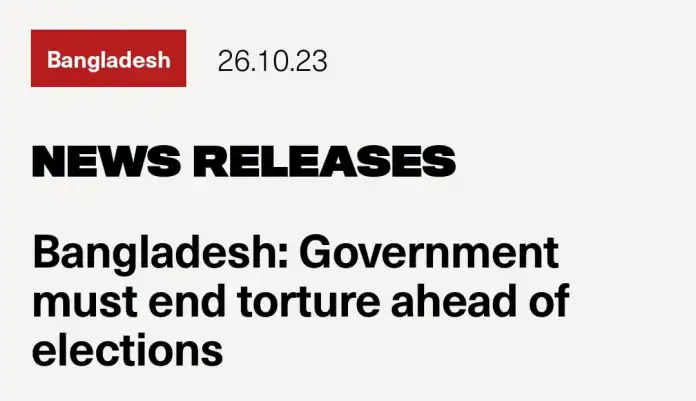 |
| Screengrab of the article by OMCT |
The media sphere saw the involvement of Michael Kugelman, a journalist who previously featured in an anti-India webinar. Kugelman penned an article in Foreign Policy, defending the Joe Biden administration's pressure tactics on the Bangladeshi government. His piece aligns with the US's narrative of championing democratic values abroad.
In August, Foreign Policy itself published a provocatively titled article, ‘Washington Can Give Bangladesh’s Democracy the Kiss of Life,’ which argued in favor of US intervention in Bangladesh's electoral process. These publications and statements, emerging from varied but influential platforms, contribute to a broader international narrative that could affect perceptions of Bangladesh's governance and its upcoming elections.
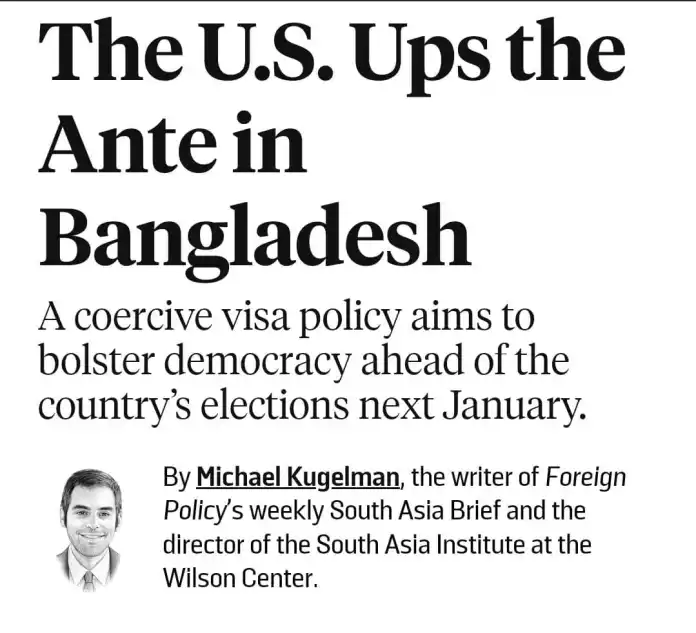 |
| Screengrab of the article by Michael Kungelman |
This multifaceted approach to international criticism, combining both overt diplomatic gestures and more subtle forms of influence through affiliated organizations and media, highlights a complex and often controversial aspect of international relations. As Bangladesh navigates these challenges, the line between foreign support for democratic principles and undue interference in national sovereignty remains a subject of intense debate and scrutiny.
Sheikh Hasina reacts to US attempt to undermine her govt
Prime Minister Sheikh Hasina's government is entrenched in a verbal tussle with the United States, sparked by what is perceived as the US's attempt to undermine her leadership. The Bangladeshi leader, known for her forthrightness, drew a parallel between her situation and the political dynamics in the US, saying, “Is (US President) Biden holding dialogue with Mr Trump? If Biden sits with Trump for dialogue, then I will hold the dialogue (with opposition),” thereby challenging the call for talks with the opposition.
Sheikh Hasina's stance is unequivocal when it comes to the opposition, particularly the Bangladesh Nationalist Party (BNP), which she labels a 'terrorist party.' Her sentiment is firm: “No dialogue with the killers. This is Bangladesh. People of the country also do not want any dialogue with killers. ‘BNP is a terrorist party, as a terrorist party they need to get a good lesson.’”
|
Despite these charged statements, Sheikh Hasina has consistently expressed her dedication to ensuring that the upcoming elections are conducted fairly. However, she perceives the US's actions as unwavering in their objective. The US, through various conduits such as agencies, aligned media outlets, and representatives, is seen as persistent in its 'regime change operation,' purportedly in the pursuit of re-establishing democratic norms.
The Prime Minister has previously articulated her apprehensions about this approach in a statement made in April, "They (US) are trying to eliminate democracy and introduce a government that will not have a democratic existence...It’ll be an undemocratic action." These words reflect a deep concern about external influences on Bangladesh's political sovereignty and the nature of democracy itself.
India's Vigilance on 'US Interference' and the 2024 General Elections
The developments in Bangladesh, where allegations of 'regime change' operations are being levelled against the United States, have cast a shadow of concern over India as it approaches its 2024 Lok Sabha elections. This situation serves as a stark reminder of the potential for foreign influence in domestic politics.
Earlier this year, Anil Tyagi, a journalist with affiliations to the Congress party, made provocative claims regarding the Bharat Jodo Yatra led by Rahul Gandhi. Tyagi suggested that the yatra was more than a political campaign; it was part of a larger strategy by foreign entities aiming to influence India's political direction. He stated, “They (foreign powers) wanted to stop the rise of Nazism in India. And who is the man who can do that task? He is none other than Rahul Gandhi, the leader of a large party (Indian National Congress). He has 40 MPs and several MLAs in different States. There is no better alternative.”
Tyagi didn't stop there; he added, “Rahul Gandhi has not been able to highlight the fear factor (Darr ki baat) and the concerns of the global powers. I am breaking news on your channel (Satya Hindi). In the past 4 months, people from different countries, who support a regime change in India, have come here,” revealing a narrative of international concern over India's political trajectory and purportedly active efforts to bring about change.
These assertions point to the delicate nature of national sovereignty in the face of international influence. As India observes the situation in Bangladesh, there is an implied caution to be vigilant against similar interference. The claims, whether validated or not, are a call to introspect on the robustness of India's democratic processes and the resilience of its institutions against any form of external influence.
Anil Tyagi's statements intensify the narrative of foreign interests in India's political landscape. He underscores the role of external entities, suggesting that "Those foreign agents are working on tools of regime change in India. This is why Rahul Gandhi’s Bharat Jodo yatra is important. What is not important is whether or not he will go to Kashmir and unfurl the tricolour." The emphasis is on the broader implications of the yatra, rather than the symbolic acts it may entail.
Tyagi further noted Rahul Gandhi's efforts as significant in achieving the objectives set by these foreign powers. He asserts, "Rahul had undertaken the 3400 km walk and completed the objective (of the foreign powers). He had successfully communicated what he intended on doing," crediting Gandhi with fulfilling the unstated goals of his long journey, which, according to Tyagi, align with international expectations.
|
These domestic discussions are echoed by prominent international figures. Notably, George Soros, in February 2023, openly advocated for a 'regime change' in India, framing it as a 'democratic revival.' This call for political upheaval from such a high-profile figure sent ripples through the discourse on national sovereignty and foreign intervention.
Complementing Soros's sentiments, Fareed Zakaria, a US-based journalist, in June, made a bold suggestion to the US government. He proposed an investment in regime change tactics over pursuing amicable bilateral relations with India, saying, "Far better to ally with India’s society itself, expanding ties with its businesses, press, NGOs, cultural groups and others," indicating a strategy that seeks to influence Indian society and politics from the grassroots and civil society level.
The political arena in India is rife with speculation, particularly concerning the activities of Rahul Gandhi, a central figure in the Indian National Congress. Reports of his secret visit to the White House amidst a 10-day US tour have sparked conversations about his international engagements and their implications for Indian politics. Adding fuel to the fire, his recent enigmatic trip to Uzbekistan has further fueled allegations of his involvement in a purported 'regime change' strategy within India. These visits, shrouded in secrecy, have raised concerns about the sanctity of India's electoral process, emphasizing that elections free from foreign influence are not just an ideal but a necessity for the nation's democratic health.
|
Analysis: The Perils of Foreign Interference in National Sovereignty
The notion of foreign interference in a nation's political processes is a serious concern. It strikes at the very heart of a country's sovereignty and the democratic right of its citizens to determine their political future. The allegations of foreign entities, such as those linked to George Soros, using figures like Rahul Gandhi as instruments for their agenda, point to a worrying trend of external forces seeking to exert influence over domestic affairs.
The involvement of foreign powers in the democratic processes of another country can distort and undermine the will of the people. It can lead to a governance that does not reflect the true aspirations and needs of the citizens but serves the strategic interests of external entities. In India's context, where democracy is a cornerstone of its national identity, any form of external meddling is not only unwelcome but also potentially damaging to its social and political fabric.
George Soros’s open call for a 'regime change' in India under the guise of a 'democratic revival' suggests an intent to reshape the political landscape to align with a particular vision or set of interests. This approach is problematic as it challenges the principle of self-determination, suggesting that a foreign blueprint may be more desirable than the organic evolution of a nation’s politics.
Fareed Zakaria's advice to the US government to engage in strategies that might influence India's societal structures, bypassing formal diplomatic relations, could set a precedent that undermines bilateral state-to-state relations. It suggests an alternative route of influence that operates outside the traditional channels of international diplomacy, potentially creating parallel power dynamics that may not align with India’s national interests.
Such interference is dangerous because it can escalate tensions within a country, polarize its society, and erode trust in its institutions. It can also strain international relations, as the targeted country may retaliate against perceived intrusions into its domestic affairs. Moreover, it can set a global precedent that weakens the international norms against interference in the internal matters of sovereign states.
India, as a rising global power with a strong democratic tradition, must remain vigilant against any interference that could compromise its political autonomy. The government, civil society, and media must be proactive in safeguarding the nation's electoral integrity, ensuring that the voice of the Indian electorate is heard without any external distortion.
As the world watches the unfolding events in Bangladesh and speculations around India's political future, it is a crucial reminder of the fragility of democracy when faced with the machinations of international power plays. It underscores the importance of vigilance, transparency, and a robust defense of national sovereignty to maintain the integrity of a nation's political landscape.
 Support Us
Support Us
Satyagraha was born from the heart of our land, with an undying aim to unveil the true essence of Bharat. It seeks to illuminate the hidden tales of our valiant freedom fighters and the rich chronicles that haven't yet sung their complete melody in the mainstream.
While platforms like NDTV and 'The Wire' effortlessly garner funds under the banner of safeguarding democracy, we at Satyagraha walk a different path. Our strength and resonance come from you. In this journey to weave a stronger Bharat, every little contribution amplifies our voice. Let's come together, contribute as you can, and champion the true spirit of our nation.
 |  |  |
| ICICI Bank of Satyaagrah | Razorpay Bank of Satyaagrah | PayPal Bank of Satyaagrah - For International Payments |
If all above doesn't work, then try the LINK below:
Please share the article on other platforms
DISCLAIMER: The author is solely responsible for the views expressed in this article. The author carries the responsibility for citing and/or licensing of images utilized within the text. The website also frequently uses non-commercial images for representational purposes only in line with the article. We are not responsible for the authenticity of such images. If some images have a copyright issue, we request the person/entity to contact us at This email address is being protected from spambots. You need JavaScript enabled to view it. and we will take the necessary actions to resolve the issue.
Related Articles
- "बस, अब और नहीं": President Trump’s executive order halted USAID’s $954M Bangladesh program, froze $72B global aid for 90 days, and cut Rohingya funds, leaving post-revolution Bangladesh, grappling with economic turmoil and a $5B bailout request
- "Secrets and Lies": Muhammad Yunus, linked to the Clintons through $13M USAID funds, $300K donation claims, IRS threats to Sheikh Hasina's son, and loans via Clinton Foundation, faces scrutiny over his daughter Monica’s alleged role in Biden’s PCAH
- Samajwadi Party workers raise anti-National, pro-Pakistan slogans during a rally in Kanpur, Uttar Pradesh
- Assam: In another major electoral victory for Bharatiya Janata Party in Assam, party swept Karbi Anglong Autonomous Council (KAAC) elections winning all 26 seats, Congress scores zero for second time
- "Sometimes we crash and burn. It's better to do it in private": F-35B military aircraft crashed on the runway at Naval Air Station Joint Reserve Base in Fort Worth, Texas, United States, pilot managed to eject himself and survive the accident
- “I wish my head could forget what my eyes have seen”: Bangladesh horror - Three Muslims Asad Miah, Milon Miah, and Kulu Miah gang-raped a Hindu housewife, after calling her on the pretext of sewing a quilt, send the video to her elder son’s phone
- "श्रापित देश": In Khulna, Bangladesh, Hindu boy Utsab Mandal killed by a Muslim mob over blasphemy accusations, with army and police present, confirmed dead by a mosque mic asking the mob to go home, local media deleted reports after video went viral
- "Whispers of death": In October 1990, 26 months before Karseva, Bangladeshi media spread a rumor that the disputed Babri structure had been demolished in India. The aftermath? 3,500 temples razed, and 2,400 Hindu women brutally raped
- 'In Trump I Trust': Donald Trump's Mar-a-Lago home raided, horde of angry supporters descends there in the hours following shock FBI raid of ex-president's Florida club, investigation focused on material that Trump took with him while leaving White House
- Bullies sneaked into the ICU to mock 12-year-old Kelaia Turner online after driving her to a suicide attempt by relentless bullying that left her with brain damage, claims a lawsuit against Greenville County Schools for failing to act despite complaints
- "The world is a great mirror. It reflects back to you what you are": Difficult to support a leader who constantly speaks negatively about their own nation: American vocalist Mary Millben offers a reality check to Congress heir Rahul Gandhi
- CPI-turned-Congress leader Kanhaiya Kumar welcomed inside Congress party office in Lucknow with Ink thrown on his face and slogan of 'Kanhaiya Kumar Murdabad', party leaders claim it was ‘acid’: Uttar Pradesh
- "Never thought, Chilgoza talks": Thanks to the US hospitality, Pannun, the Khalistani maestro of threats, is back with another warning, this time, he plans to return the favor to India's alleged assassination attempt with a grand assault on the Parliament
- "देख रहे हो न विनोद": Soros and Clinton, among 19 to be awarded the Presidential Medal of Freedom by Biden; Soros’s Open Society Foundations faces scrutiny for funding anti-India activities and narratives against PM Modi’s democratically elected govt
- "Kaun Banega Rashtrapati - Voting to elect 15th President of India begins": Over 4800 MPs-MLAs to cast votes, NDA candidate Droupadi Murmu has clear edge over Opposition nominee Yashwant Sinha as 60% votes expected to be polled in her favour




















